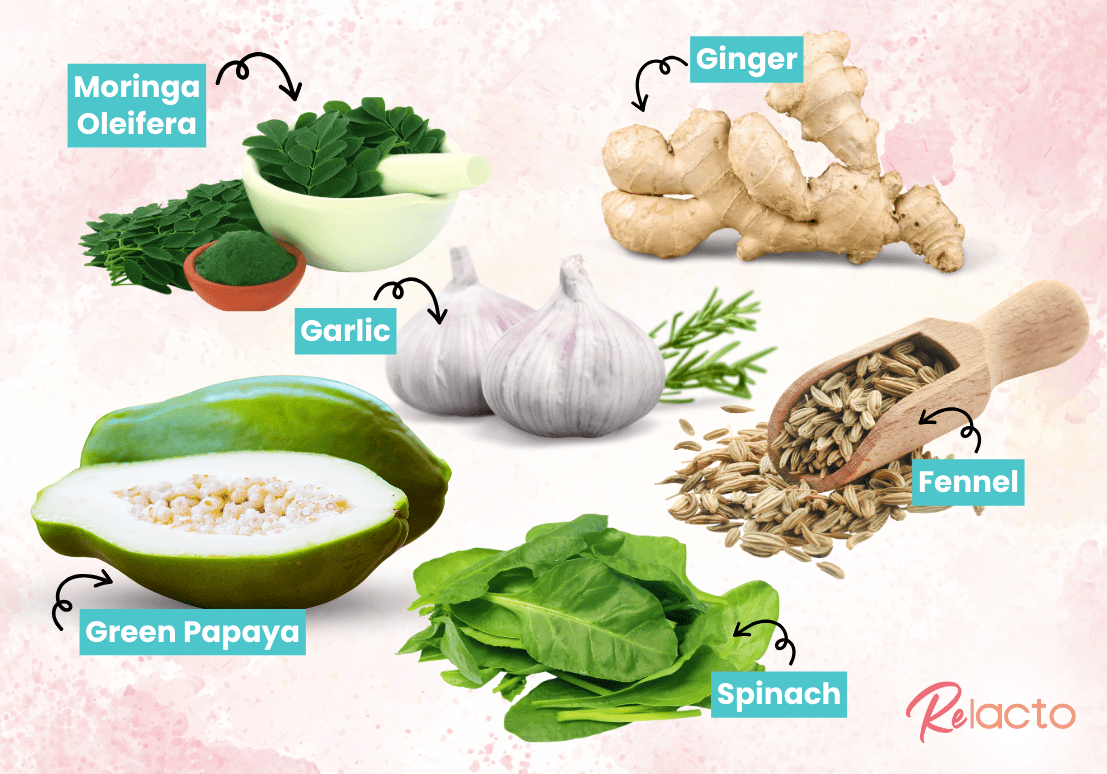Do Lactogenic Foods Really Help Breastfeeding?

As a mum who breastfeeds, your journey is full of different feelings: lots of love and happiness, but sometimes a bit of worry, too. You’re always looking for easy, comforting ways to make breastfeeding go smoothly for you and your baby.
The main factor that mums need to understand is that the amount of breast milk you make depends on how much your baby needs. This means that the more you feed, the more milk your body will produce. Other factors like how much water you drink, how stressed you are, spending time away with your baby, and being pregnant again are minor factors that may influence your milk supply.
Similarly, lactogenic foods play a supplementary role in supporting mothers with breastfeeding. Traditionally, it is believed that these are special foods by nature to help with milk production.
But the big question is, do these foods help increase the breast milk you produce? Well, let’s understand more on this topic as we grab a cup of tea (maybe with a hint of fenugreek!).
Understanding Lactogenic Foods
Lactogenic foods, also called galactagogues in medical terms, are the kinds of foods and herbs that help in breast milk production. ‘Lactogenic’ comes from two Latin words: ‘lacto’, which means milk, and ‘genic’, which means to make or produce.
While there has been some scientific research on these foods, much of what we understand comes from long-standing traditions. The recommended lactogenic foods to increase milk supply are those rich in certain ingredients, which can stimulate the hormones responsible for milk production.
Hormones & Milk Production
Breastfeeding works thanks to two special helpers in the body called hormones: oxytocin and prolactin. It all begins when a baby starts feeding. This moment tells the mum’s brain to raise prolactin, the hormone that makes milk. During pregnancy, prolactin is like a paused video waiting for its turn. As soon as the baby is born, it starts making milk.
The second helper, oxytocin, has a different job. Think of it as the delivery van that brings the milk out when mum feeds her baby or even just thinks about them. But if mum is stressed or in pain, it can affect the flow. Oxytocin has another important job, too. After the baby is born, it helps the mum’s uterus shrink back to its normal size. This can be a bit uncomfortable, but it’s really important for her to get better. These two hormones make breastfeeding work so well for mum and baby.

Popular Lactogenic Foods
Various lactogenic foods are available, including herbs like fenugreek and fennel, and vegetables like garlic. This diversity is great because it means mothers with different eating habits can find something suitable for them. These foods are potentially helpful for milk production and give extra nutrition to a mother’s diet, making them a healthy choice.
And when it comes to increasing breast milk production, certain foods have gained popularity among breastfeeding mothers. Let’s take a closer look at some of these well-known lactogenic foods:
Garlic: Garlic not only adds a great flavour to meals, but it’s also thought to improve the taste and smell of breast milk. This can make it easier for babies to adapt to breastfeeding and may encourage them to feed for longer periods.
Papaya: Often recommended to nursing mothers, papaya is considered to help increase milk production. It works by stimulating the smooth muscles involved in expressing milk, making it easier for the milk to flow.
Moringa Oleifera: Also known as the Drumstick Tree or Horseradish Tree, Moringa Oleifera is praised for increasing milk secretion. Its leaves, usually consumed in powdered form, are said to stimulate hormones responsible for milk production.
Fenugreek: A familiar spice in many kitchens, fenugreek has been traditionally used to help with lactation. It’s commonly included in lactation teas and supplements, although research is still ongoing to understand its effectiveness fully.
Fennel: Fennel, both a herb and a spice, is known for reducing the effects of hormones that inhibit milk production. It also helps smooth the milk flow, making it a popular choice for breastfeeding mothers.
Ginger: Ginger is known for improving blood circulation around the mammary glands, which can help improve the overall milk supply. It’s also a common ingredient in traditional meals prepared for women in their postnatal phase, as it’s believed to increase blood flow and milk production.
Conclusion
In exploring lactogenic foods, it’s essential to remember that the primary principle in improving milk supply is the frequency of nursing or pumping. Lactogenic foods serve as a natural support system in this journey. While further research is needed to understand their effectiveness fully, adding them to your diet can support a healthy part of your breastfeeding journey.
Trying lactogenic foods has to be a balanced and informed decision. At ReLacto, we offer lactogenic food package reviewed by our dietitian, ensuring you enjoy a variety of lactogenic foods while maintaining a balanced diet.







